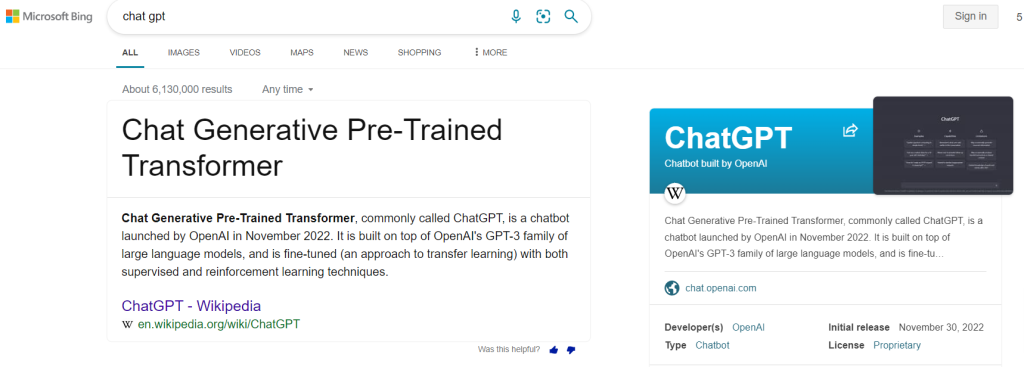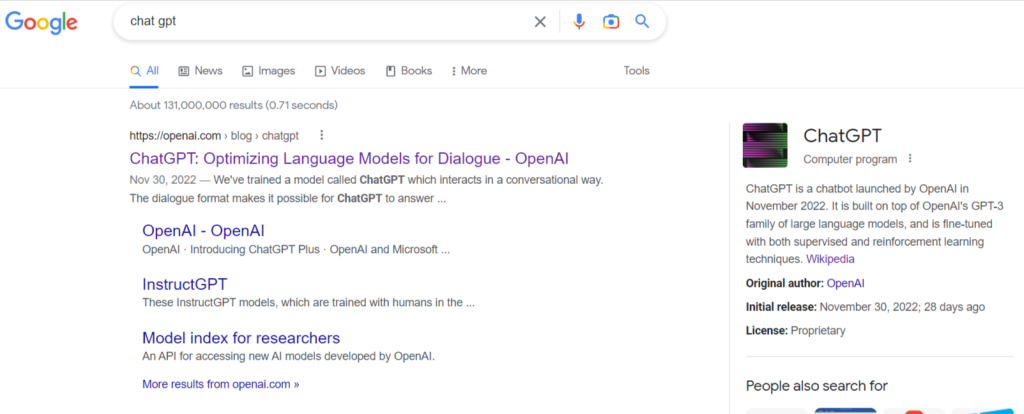The conclusion drawn in my post, “Will ChatGPT A.I. Technology Replace Quality Organic Search Results?“, was premature. The generative artificial intelligence now in use on Bing.com has already improved upon basic (pre-A.I. powered) organic search engine results in very significant ways.
ChatGPT
Will ChatGPT A.I. Technology Replace Quality Organic Search Results?
In case you haven’t heard, ChatGPT is new software that uses artificial intelligence (along with human “trainers”) to answer questions. Like many forms of natural language-based AI machine learning, the human trainers refine the answers and tell ChatGPT how it can improve them. Some answers to basic questions are surprisingly good, and others are not so hot.
The widespread excitement around ChatGPT is that it may replace human writers in some cases, or significantly reduce the time required to do less important writing work. Is this a huge leap forward in a long line of robot-based solutions to the need for written content? Microsoft is investing billions in the company that created ChatGPT, and is thinking about giving it a shot at improving search results in its Bing version of Google search. But, at least for the foreseeable future, I don’t think it’s going to be as successful as all the latest buzz suggests.
According to knowledgeable sources, the Bing search engine will probably be using ChatGPT to answer some questions in its search results pages rather than what it currently offers as the “best” results. Why? Because they hope to beat Google at satisfying users, getting people to switch to Bing, and generating more ad revenue. Which one will win, ChatGPT-generated results or results from Google’s proven and constantly improving search algorithm? TL;DR Google.
As with Bing search results in general, Bing’s are currently inferior to Google’s. Let’s compare the search results for “chat gpt” in Bing vs. Google. Bing offers the Wikipedia definition for “Chat Generative Pre-Trained Transformer” as the first result at the top left of the page AND in the sidebar on the right. Redundant results are unhelpful.

Google, on the other hand, offers a link to a page on the website of the company that created ChatGPT, OpenAI – along with other helpful links to the site, including the homepage – as the first result. Which of these is more useful? For one thing, the title of the Google result begins with the search term itself: “ChatGPT”. If I’m searching for “chat gpt” and not “chat generative pre-trained transformer”, I may not even know it’s the same thing. As the user experience saying goes, Don’t Make Me Think. Also, Google shows me the primary source, the most authoritative source for the explanation, from the OpenAI website, AND it puts the Wikipedia result in the sidebar at the top of the results page. Google lets me choose which one to read. Choice versus redundancy. Which do you prefer?

Most people will click the first result at the top left, rather than the one in the sidebar. This has been proven in many tests done on search results. But, if human readers do want more information from what is probably the second best result, Google offers the Wikipedia definition on the right.
And let’s think logically about the answer to the related question: Which result will be more authoritative and useful to the human reader, Wikipedia or ChatGPT’s AI generated result? Right now, the obvious answer is Wikipedia. It’s written by humans, curated by humans, and edited by humans. The best ChatGPT’s AI can do is APPROXIMATE Wikipedia and/or OpenAI’s answers. Human readers want human answers. ChatGPT is an ARTIFICIAL substitute. Could ChatGPT do better than either one? Maybe, just maybe, in the future. Right now the answer is clearly No.
Microsoft Bing is essentially going to perform a pointless A/B test. When the results are in, Google will win, and they won’t even have to lower the quality of their own results to do so.
Bing search results for “chat gpt”
(Author’s note: My blog post above was written on Jan 31, 2023. As of Feb 2, 2023, Bing results appear to have changed to match Google, and ads are appearing above the organic results.)